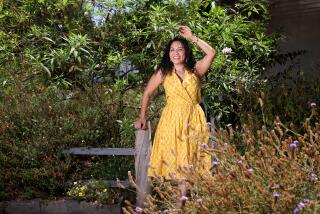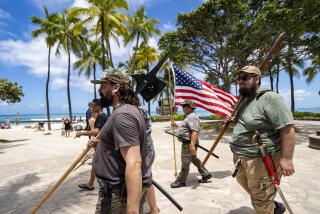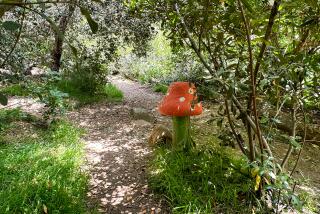The state’s tiniest city--less than a square...
- Share via
The state’s tiniest city--less than a square mile in size--is facing big problems these days.
Hawaiian Gardens--hemmed in by Artesia, Lakewood, Long Beach and the Los Angeles County border--long has been plagued by chronic poverty, high unemployment and rampant crime.
In addition, rancorous elections have at times been marked by personal attacks, thefts, vandalism, voter fraud and even animal slaughter. “Hawaiian Gardens is a tough place to be involved in elections,” said Kathleen Navejas, a 10-year veteran. “If you can do this, you can do anything.”
But now, the largely Latino, working-class community of 14,000 is faced with a budget deficit of $1.5 million, which has been building gradually over the last six years.
Helping to drive its financial woes was the decision earlier this year to start up a $2.1-million-a-year police department. That is $500,000 more than the county Sheriff’s Department had charged to patrol the community. A 6% utility tax, set up to help finance the department, has yielded little revenue because many residents are so poor that they are exempt.
The new acting city administrator, Charles Gomez, expresses confidence that the city can pull out of these rocky days. Gomez is optimistic that he can pull Hawaiian Gardens from its financial quandary, pay its employees and balance its budget by early next year. “I can get a city out of some gnarly financial situations.”
(BEGIN TEXT OF INFOBOX / INFOGRAPHIC)
Hawaiian Gardens / Inside Out
ENTERPRISING START: The city of Hawaiian Gardens, which is about 2,500 miles east of Honolulu, took its name from the establishment of an enterprising local bootlegger, who patched together a bamboo-and-thatched-roof punch stand that served sometimes-homemade brew to travelers along the old Coyote Creek Trail during the heyday of Prohibition in the 1920s.
*
NO HAWAII, NO GARDENS: Residents still affectionately refer to the city as “the Gardens.” But City Hall receives hundreds of calls a year from visitors asking where the municipal gardens are located (there aren’t any). Despite its name, the community isn’t Hawaiian, either. Other than that, the name is completely accurate.
*
NEWER NAMES: Because of flooding and swamps that once plagued the area, Hawaiian Gardens has picked up a couple of less flattering names: “Billygoat Acres” and “Cesspool Acres.” A former Hawaiian Gardens homeowner said, “It is in the middle of everything and the center of absolutely nothing.”
*
“BURRITO KING”: More than 15 years ago, Ruben Rodriguez’s castle didn’t have a moat or a drawbridge. In fact, the self-described king of the burrito didn’t even have a drive-through. But the tiny taco stand on Carson Street that King Ruben built did have a large sign welcoming hungry patrons to the Green Burrito. It would become the first of an empire of guacamole, tacos and burritos in a chain of 67 Mexican-style restaurants.
*
CLAIM TO FAME: “Walkin’ Willie” Croker, a former Hawaiian Gardens carwash operator, met with President George Bush at the White House in 1989, after completing his second cross-country walk for cancer awareness. After losing his family to cancer, Croker estimated that he walked more than 20,000 miles during his 21-year crusade. Croker has since hung up his walking shoes and lives in Pico Rivera.
(BEGIN TEXT OF INFOBOX / INFOGRAPHIC)
By The Numbers
CITY BUSINESS
Date founded: April 4, 1964
Area in square miles: .9 square miles
Number of parks: 3
Number of city employees: 98
1995-96 budget: $4 million
*
ETHNIC MAKEUP
Latino: 67%
White: 20%
Asian: 9%
Black: 4%
*
PEOPLE
Population: 13,639
Households: 3,463
Average household size: 3.9
Median age: 24.8
*
MONEY AND WORK
Median household income: $29,510
Median household income / LA County: $34,965
Median home value: $136,100
Employed workers (16 and older): 5,647
Women in labor force: 80.7%
Men in labor force: 50.6%
Self-employed: 240
Car-poolers: 1,224
*
AGES:
0-17 years old: 35%
18-34 years old: 35%
35-49 years old: 17%
50-64 years old: 8%
65 years and over: 5%
*
VEHICLE OWNERSHIP
One car: 40%
Two cars: 37%
Three or more cars: 16%
None: 7%
*
SHOPPING
Total stores: 112
Total employees: 791
Annual sales: $79.9 million
Restaurants: 31
Grocery stores: 8
Liquor stores: 4
Record/tape stores: 4
Retail bakeries: 4
Shoe stores: 3
Florists: 2
Book stores: 2
Car dealers: (new and used): 1
Furniture stores: 1
Source: Claritas Inc. Household expenses are averages for 1994. All other figures are for 1990. Percentages have been rounded to the nearest whole number.
More to Read
Sign up for Essential California
The most important California stories and recommendations in your inbox every morning.
You may occasionally receive promotional content from the Los Angeles Times.










